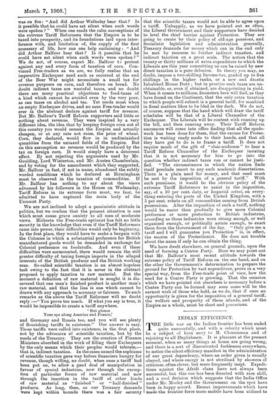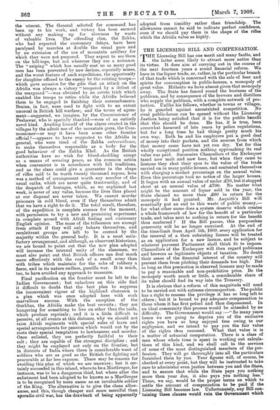INDIAN EFFICIENCY.
THE little war on the Indian frontier has been ended quite successfully, and with a celerity which must be a subject of keen envy to M. Clemenceau and of rejoicing to all Rnglishmen. It is pleasant at the present moment, when so many things at home are going wrong, and there is a sort of discontented feebleness everywhere, to notice the silent efficiency manifest in the administration of our great dependency, where an order given is usually obeyed, and where energy is not sterilised by showers of criticism, often clever, but more frequently inept. Expedi- tions against the Afridi clans have not always been successful, but this one has been directed with rare skill, and a cool decision which suggests that the India Office under Mr. Morley and the Government on the spot have been in happy accord. Recent improvements which have made the frontier force more mobile have been utilised to the utmost. The General selected for command has been up to his work, and victory has been secured without any making up for slowness by waste of valuable lives. The offending clan, the Zakka, who had expected the customary delays, have been paralysed by marches at double the usual pace and by an extension of the use of mountain artillery for which they were not prepared. They expect to see them on the hill-tops, but not wherever they are a nuisance. The " sniping " which has usually cost us so many good men has been prevented by new devices, especially mines, and the worst feature of such expeditions, the opportunity for slaughter offered to the enemy by the retiring troops— which gave occasion for the gibe that an attack on the Afridis was always a victory " tempered by a defeat of the rearguard "—was obviated by an astute trick which enabled the troops to retire while the Afridis believed them to be engaged in finishing their entrenchments. Brains, in fact, were used to fight with to an extent unusual in British hill warfare; and the terms of agree- ment—suggested, we imagine, by the Commissioner of Peshawar, who is specially thanked—were of an entirely novel kind. Availing himself of the alarm created in the villages by the adroit use of the mountain guns, the Com- missioner—or may it have been some other frontier official 9—appears to have suggested to the Afridis in general, who were tired of the Zakka outrecuidance, to make themselves responsible as a, body for the good behaviour of the Zakka Khel. As the British authorities have no wish for blood-shedding except as a means of securing peace, as the common action when convenient is in accordance with hill traditions, and as the clans could give a, guarantee in the shape of rifles said to be worth twenty thousand rupees, here was a method of arrangement worth any number of the usual oaths, which are never quite trustworthy, and of the despatch of hostages, which, as we explained last week, is never of any value, because the lives thus placed at our disposal are never taken. We cannot murder prisoners in cold blood, even if they themselves admit that we have a right to do it. The total result, therefore, of the expedition is complete success for the moment, with permission to try a new and promising experiment in complete accord with Afridi feeling and customary English opinion. The mass of the tribesmen are exempt from attack if they will only behave themselves, and recalcitrant groups are left to be coerced by the majority within the general body. It is a most satis- factory arrangement, and although, as observant historians, we are bound to point out that the new plan adopted will increase the internal unity of the clansmen, we must also point out that British officers can deal much more effectively with the rush of a small army than with tribes which maintain for the sake of robbery a fierce, and in its nature endless, guerilla war. It is much, too, to have avoided any approach to massacre.
Final pacification on the frontier must be left to the Indian Government ; but onlookers on this side find it difficult to doubt that the best plan to suppress the inconvenient vigour of the highland clansmen is a plan which was once adopted here with such marvellous success. With the exception of the Gurkhas, the Afridis make the best recruits ; they are hungering for something to live on other than the raids, which produce reprisals ; and it is a little difficult to perceive, at all events at this distance, why we should not raise Afridi regiments with special rules of leave and special arrangements for pension which would cut by the roots their special temptation to lawlessness and murder. Once enlisted, they are perfectly faithful to their salt ; they are capable of the strongest discipline ; and they might be employed not only on the frontier, but in districts of India where there is considerable want of soldiers who are as good as the British for fighting and procurable at far less expense. There may be reasons for avoiding this plan of which we are unaware; but it cer- tainly succeeded in this island, where to be a MacGregor, for instance, was to be a dangerous thief, but where after the enlistment had been adopted to be known as a MacGregor is to be recognised by mere name as an invaluable soldier of the King. The alternative is to give the clans allow- ances, and this, though cheaper and more merciful than sporadic civil war, has the drawback of being apparently adopted from timidity rather than friendship. The allowances cannot be said to indicate perfect confidence, even if we should pay them in the shape of the rifles which the Afridis value so highly.















































 Previous page
Previous page